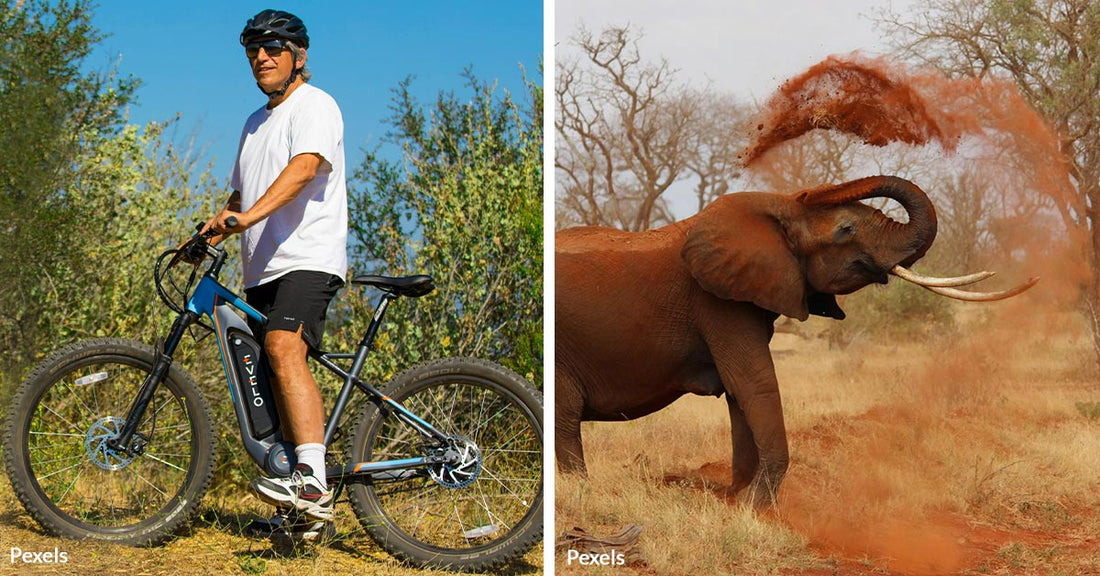E-Bikes Are the New Secret Weapon Against African Poachers
Matthew Russell
In the vast and rugged terrains of Africa, a silent revolution is taking place. E-bikes from brands like Specialized and CAKE are being deployed to combat poaching, a major threat to wildlife conservation in the region.
These innovative vehicles are proving to be a crucial tool in protecting endangered species and aiding conservation efforts in ways that traditional methods have struggled to achieve.

The Rise of E-Bikes in Conservation
Specialized's Turbo Vado and Tero e-bikes are making waves in the conservation community. These bikes, Pinkbike reports, equipped with rugged tires, front and rear suspension, and powerful electric motors, are designed to handle the tough conditions of the African bush. They offer a top speed of 28mph and can cover around 90 miles on a single charge in Eco mode.
The initiative to integrate e-bikes into conservation efforts was spearheaded by the Wild Bike Foundation, founded by Devlin and Katie Fogg. Their vision was to provide conservationists with an effective, sustainable means of patrolling large areas.
"We kept thinking, surely e-bikes could help," Devlin Fogg told Pinkbike. This vision resonated with Specialized, whose Soil Searching program supports trail building and environmental advocacy.

Silent and Efficient Patrols
The primary advantage of e-bikes over traditional patrol vehicles is their quiet operation. Gas-powered motorcycles, while effective, often alert poachers to their presence, giving them time to flee.
E-bikes, on the other hand, can approach silently, offering a significant tactical advantage. This stealth capability is particularly beneficial in anti-poaching operations, where surprise can be a crucial factor, RideApart reports.
Specialized's partnership with the Wild Bike Foundation has placed e-bikes in several key conservation areas, including the Somkhanda Community Game Reserve and the Munywana Conservancy. These bikes are used for a variety of tasks, from fence patrols to habitat management. At Somkhanda, the e-bikes have enabled rangers to cover more ground with reduced operating costs.
"The e-bikes obviously run with less noise which aids in certain patrols," Meiring Prinsloo, the reserve manager, told Pinkbike.

Technological Edge: Solar-Powered E-Bikes
CAKE, another major player in this initiative, has partnered with the Southern African Wildlife College to introduce the Kalk AP electric motorcycle. These bikes are not only silent but also come with solar charging capabilities, provided by Goal Zero. This ensures that the bikes can operate in remote areas without the need for electrical infrastructure, making them highly effective in vast, inaccessible regions, RideApart reports.
The Kalk AP bikes are designed specifically for anti-poaching with features like biodegradable polymer fenders and software tuned for high temperatures. They also come equipped with clip-on lights for nighttime operations, making them versatile for various patrol scenarios.
As RideApart reports, CAKE's approach also includes a charity component, where each bike purchase funds another bike for the wildlife college, enhancing the impact of their initiative.

Community Impact and Education
Beyond their role in anti-poaching, e-bikes are also transforming community outreach and education. The Africa Foundation's ECHO Project, for example, uses Specialized e-bikes to facilitate environmental education in rural schools.
These bikes help project facilitators like Sihle Hlabissa reach multiple schools efficiently, promoting conservation awareness among young students. "Before I received the bike, I walked and tried to catch lifts, which made it hard to predict exactly what time I could get to the schools," Hlabissa told Pinkbike.
The e-bike has not only improved his mobility but also added a sense of dignity and curiosity to his work, drawing more attention to conservation efforts.
The Africa Foundation also runs the Hustle Economy program, supporting micro-entrepreneurs in rural areas. E-bikes have proven invaluable in this context as well, enabling facilitators to visit numerous small businesses efficiently. This program has helped many individuals start and sustain businesses, contributing to economic stability in communities that are crucial to conservation efforts.

Challenges and Future Prospects
While the integration of e-bikes into conservation has shown promising results, it is not without challenges. The rugged terrain of the African bush can be tough on equipment, necessitating frequent maintenance and upgrades. For instance, the Zululand thorns posed significant issues initially, leading to enhancements in tire durability. Continuous support and training for local technicians are essential to keep these bikes operational in the field, Pinkbike reports.
Looking ahead, the potential for e-bikes in conservation is vast. There are plans to develop purpose-built bikes specifically for anti-poaching and even explore eco-tourism opportunities where visitors could experience wildlife from e-bikes. As Devlin Fogg optimistically noted, "Imagine what we can do with 50 bikes compared to 12, or 100 bikes compared to 50?"

